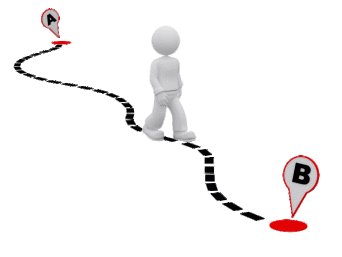Okay…
This is neither my thesis, nor a discussion of the inner workings of some new Star Trek episode. Instead, this is a discussion on the importance of flexibility as my clients navigate the ever-changing world of business.
 The paradigm shift is essential to successfully navigating the daily tasks required to achieve your long-term success. Allow me to begin with the clarification of the term as to avoid any misunderstanding: Paradigm -the position from which you view & deal with your current environment.
The paradigm shift is essential to successfully navigating the daily tasks required to achieve your long-term success. Allow me to begin with the clarification of the term as to avoid any misunderstanding: Paradigm -the position from which you view & deal with your current environment.
In order to effectively deal with each interaction (with bankers, partners, employees, invoicing problems, or unforeseen challenges) the entrepreneur must first have a full and clear understanding of her / his current position. Having a clear understanding of your identity, your strengths, weaknesses, passions, and dislikes will afford you the ability to be more objective. How? Simple. If a situation presents itself as an obstacle to the success of your revenue model, yet happens to require a skill you know you lack, you have three options:
- Go buy “Skills I Lack for Dummies” from the bookstore, and hope you get it right.
- Allow your ego to take the lead; filing bankruptcy later is just what that ego needs.
- Seek help.
Without going into nuclear physics, we can all agree that the shortest distance between two points is a straight line. It goes without saying that if you are not clear on “Point A” (where you stand, skills you possess, resources you require…), it is not likely that you will successfully reach “Point B.”
 So why are we talking about paradigm shifting? There is a major misconception with the Point A to Point B conversation. A large number of individuals see themselves as Point A, and their goals as Point B. This is incorrect. Point A is the position which your reality demands that you take as you discern the desired outcome of the situation (whether your 10 year goals, or collecting a 45 day old accounts receivable). The “this is me” defense has no place in a world where the value assigned to who you are is a product of the context you find yourself in at the time (client, employer, mother, son, etc.).
So why are we talking about paradigm shifting? There is a major misconception with the Point A to Point B conversation. A large number of individuals see themselves as Point A, and their goals as Point B. This is incorrect. Point A is the position which your reality demands that you take as you discern the desired outcome of the situation (whether your 10 year goals, or collecting a 45 day old accounts receivable). The “this is me” defense has no place in a world where the value assigned to who you are is a product of the context you find yourself in at the time (client, employer, mother, son, etc.).
The ability to be flexible in your approach and honest about your capacity is vital if long-term success is of interest to you.
Methods of adjustment: Personality versus Character; a concept I welcome you to read further into via Stephen Covey’s work “Seven Habits of Highly Effective People.”
Personality is the method of adjusting to our environment which you are surely familiar with as self-help books pushing quick fixes to issues that reside in your core are peddled by every bookstore, and self-appointed motivational speaker in town. Smile. Eye contact. Listen for the objection before responding. These tactics may work in the short-term, but long-term success requires long-term relationships which you’re not going to build by throwing around a fake smile.
Character is the method of adjusting to our environment by dealing with people and situations by the unbreakable values which define who we truly are. When you smile, mean it. When you give eye contact, do it because you care enough to pay attention to what they have to say. When you listen, hear every word they say and ask questions to gain understanding.
It is from our core/ our character, that we find ourselves at Point A, and in a much better position to discern where Point B is, and more importantly how to get there. Paradigm shifting, when operating from your core, is simplified (as you have chosen to elevate above the plane of the zero-sum game).
Discover more from GrowExpand.com
Subscribe to get the latest posts sent to your email.